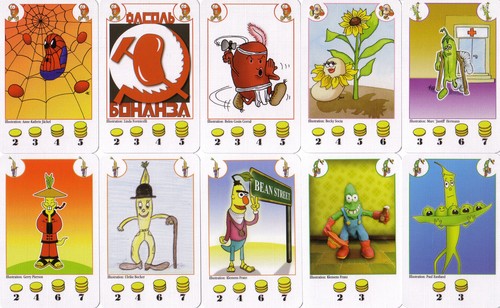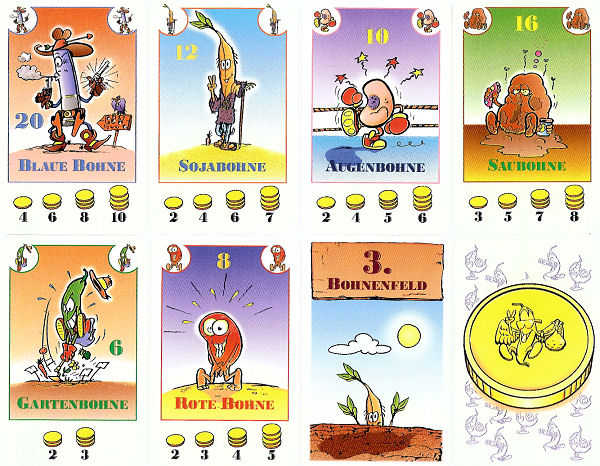Bohnanza
Game of the Year 1997: shortlist German Games Award 1997: 5th place à la carte Card Game Award 1997: 1st place Dutch Games Award 2003: Nominated
Bohnanza is a card game for three to five people. It was designed by Uwe Rosenberg and published in 1997 by Amigo -Verlag. By January 2007 700.000 games sold.
Game
The name comes from the word game " Bonanza" and " bean". The game has nothing to do with the western series Bonanza, but rather with the meaning of the English word bonanza ( windfall, bonanza, unexpectedly large profit). The players are bean farmers who try profitably grow different varieties beans and harvest. Players interact by exchanging the beans. The special attraction of Bohnanza is that each player can indeed form two homogeneous stack ( " bean fields " ) with his cards, but the order of his cards can not change. Inappropriate maps thus requiring either a ( premature and possibly unprofitable ) harvesting a bean field or the exchange with another player.
Bohnanza is recommended for ages 12 and lasts about 45 minutes without extensions. It finished 1997 ranked fifth among the German Game Prize, was added to the selection list Game of the Year and awarded the à la carte card game price.
Meanwhile, numerous extensions and two books have been published in addition to the original game. In collaboration with " Adam plays " has also developed a wooden box for storing published by Amigo Bohnanzaspiele, which is long out of print.
Extensions
Uwe Rosenberg has released several enhancements to Bohnanza within its micro- publisher Lookout Games, partly together with Hanno Girke. Of these, some extensions have been adopted by Amigo and published in large numbers. The extensions of Lookout Games are each (usually of 2,500 pieces ) published in a limited edition in selected shops and all out of print. The extensions can be combined with each other and, accordingly, increase complexity and duration of the game.
In Amigo available Extensions:
- Extension: The kit is now allowed seven players and leads four new species of beans and " job card " one.
- Al Cabohne: Two players play against the " Bean Mafia " two to three simple, but cleverly simulated opponent. The game is playable independently and also allows the solo game.
- High Bohn: High Bohn allowed the purchase of Monopoly -like property of a western town, which give the players new skills. For the game Al Cabohne a " Prohibohn " is included called game mode with similar goals.
- La Isla Bohnita: stretches the game out on the lake; Players can move to ports in order to exchange them beans, and store beans on ships. With pirate ships they can to snatch the beans.
- Bohnaparte: changes from the game Goal: The thaler of crops used for risk - related warfare in Bohnreich. The game contains cards to assemble an appropriate pitch.
- Ladybohn: performing a " Böhninnen " in the game, which will be planted with their male counterparts, but more points are worth.
- Bohnröschen (2007): There is now tendrils cards that can take advantage of the opponent player to earn an additional 5 beans Credits: Easier said than done, because tendrils climbing a map requires the fulfillment of a task (35 in total).
- Bohnanza Fun & Easy (2010): This is a simplified Bohnanzaversion developed for children aged eight and makes a new witty graphic impression.
- Dice Bohnanza (2012 ): This independent version of the card game is played with seven cubes. Players must solve with these different orders.
- Bohn to be wild (2012 ): Anniversary Issue (15 years Bohnanza ) with new bean varieties and action cards.
In published Lookout Games Extensions:
- High Bohn ( 2000) ( now published by Amigo ).
- Mutabohn (2001) turned the game belonging: It is now possible to plant beans heterogeneous fields as well as to gain additional points through special Saatkombinationen.
- Ladybohn (2002) ( now with modified rules of Amigo published)
- Bohnaparte (published in a limited edition of 2500 copies numbered from Lookout Games, now at Amigo appeared in unlimited version) ( 2003)
- Genghis Bohn (2003) is an extension for Bohnaparte and performs additional players (up to seven ) and a terrain types. (Published in a limited edition of 2500 copies numbered from Lookout Games, now included with Amigo in not limited Bohnaparte as so-called " riders variant" )
- Telebohn (2004) allowed the acquisition of whole bean fields ( this extension is with the limited quantity of 5,000 copies numbered at Lookout Games published ).
- Rabohnzel ( 2005) ( independent of this game is in a limited edition of 3,000 copies without numbering at Lookout Games published ). Players mix potions and use the magical abilities of their enchanted beans, in order to reach more victory points ( beans pounds).
- Kannibohne ( 2006) ( this independent game is numbered in a limited edition of 2,500 copies at Lookout Games published ). It's thematically to ensure that both players (hence also extend the 33 cards completely from ) each other with their " Kannibohnen " annoy, actually regular beans, but which may develop at certain phases of the turn own abilities.
- On the Schwabian Eisenbohn ( 2008) ( in a limited number of 2500 copies numbered from Lookout Games published)
- Bohnedikt ( 2009) ( in a limited edition of 2500 copies numbered from Lookout Games published). Players plant their beans on special bean fields. In " God's Acre " can be cultivated by hand out of turn beans, on the " Bisch yard" may Joker beans are grown. The Joker beans hot Bohnedikte because they cause also special rules.
- Mutterböhnchen ( 2010) ( in a limited edition of 2500 copies numbered from Lookout Games published). This is an extension for the edited by Amigo Ladybohn.
- Bohn Camillo ( 2011) ( in a limited edition of 2500 copies numbered from Lookout Games published). This is an extension for two players to be used with the additional action cards.
Lookout Games strives to publish annually a small extension to usually 33 cards, which is usually sold for the first time at the International Toy Fair in Essen game.
All extensions (except Al Cabohne, Rabohnzel, Kannibohne and the Amigo Ladybohn ) require the possession of the game or the knowledge of its rules.
Furthermore fair giveaways were offered on the " game" in Essen, which could be purchased for free or very cheap:
- Beans Chips was invited themselves to invent rules for
- Bohn Hansa cities majorities This is a small extension to the board game Bohn Hansa
In a Bohnanza tournament there were also rubber key fob to purchase, which showed a kidney bean.
- Bohnanza The fan book (2007) to mark the tenth anniversary came this 384 pages thick book. It includes, among other things, the history of the game and interviews with the creators. For professionals and especially interested also additional rules and explanations are added to all variants.
- The large Bohnanza Book ( 2007) This book contains many comics around the beans, interviews, previously unpublished drawings and six new playing cards.
The Settlers of Catan and Bohnanza
The author Games Bohnanza series satirizes indirectly the well-known German "The Settlers of Catan " series. Not only are all Bohnanza variants with a player more playable than "Settlers of Catan", the extensions are very similar to Catan extensions: La Isla Bohnita corresponds thematically to " navigators of Catan " High Bohn corresponds to " Cities and Knights ".
Related Games
- Al Cabohne is effectively the same game principle (see above), but a separate game.
- Space Beans is Bohnanza in space, similar to the star riders of Catan.
- Bohnkick ( "The Miracle of Bohn " ) is Bohnanza as a football game.
- Dice Bohnanza (2012 ) is a dice game in the Bohnanzawelt.
- Bohn Hansa is a board game in the Bohnanzawelt.
- Bohniversum is a puzzle in the Bohnanzawelt.








